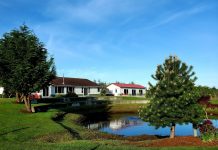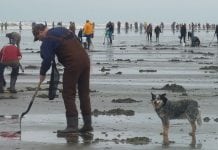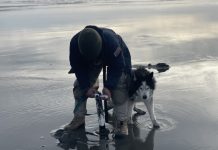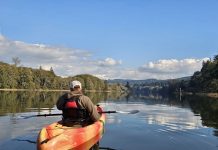This calendar is the place to find fun events happening throughout Grays Harbor County including Aberdeen, Hoquiam, Westport, Ocean Shores, Elma, Montesano and beyond.
Have an event that isn’t listed? Please email events@GraysHarborTalk.com with the following information:
- Name of Event
- Date, time and location (name of business if applicable and complete address)
- Organizer(s) name
- Cost
- URL to purchase tickets
- Website URL
- SHORT description of event
- Photo
Our editors will review and post within a few business days.

Celebrate Mother’s Day with a Delightful Breakfast and Stay for Worship. First Presbyterian Church Men’s Group invites you to a Mother’s Day Breakfast on May 12, 2024 from 8:30 – 9:30 am. We are located at 420 N Broadway, Aberdeen, WA 98520. For more info, check out our web site at aberdeenpres.org
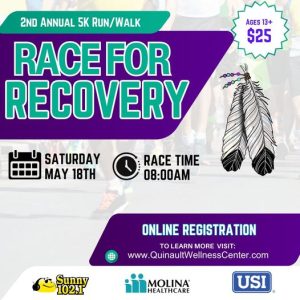
The 2nd Annual Race for Recovery will be held on Saturday, May 18, 2024, starting at 8:00 am. The Race for Recovery is organized by the Quinault Wellness Center in Aberdeen, Washington. The Quinault Wellness Center supports the local community by providing a holistic approach for the treatment of substance use disorders. All community members are accepted; you do not have to be a tribal member to be a patient. Our low barrier services aim to provide accessible and non-judgmental care to individuals seeking help, regardless of their circumstances. We understand that life can be challenging and that everyone has unique experiences, that’s why our services are tailored to meet our clients specific needs.
At Quinault Wellness Center, we understand the profound impact of substance use disorders on individuals, families, and the community at large. We are dedicated to providing comprehensive and compassionate care that addresses not only the addiction itself but also the underlying issues that contribute to it.
Your race registration will include a gift bag and a t-shirt. If you would like to make an additional donation please reach out to the Quinault Wellness Center at accounts.payable@quinaultwc.org.
Kids 12 and under can race for free if participating with an adult! Take advantage of this great deal using coupon code: Child#24.
Division winners will receive a gift basket, and hold the honors of being “the best”.
If you are in need of assistance to cover the cost of the race please reach out to the Quinault Wellness Center at accounts.payable@quinaultwc.org for our coupon code.
Come celebrate summer at the beach with one of the largest events in Ocean Shores – Five Star Dealerships’ Sand and Sawdust Festival on Friday, June 28th through Sunday, June 30th. This free annual festival located at the Ocean Shores Convention Center celebrates our State’s timberlands and our beaches with a Chainsaw Art Show and Auction and Sandcastle and Sand Sculpture Contest.
Come celebrate summer at the beach with one of the largest events in Ocean Shores – Five Star Dealerships’ Sand and Sawdust Festival on Friday, June 28th through Sunday, June 30th. This free annual festival located at the Ocean Shores Convention Center celebrates our State’s timberlands and our beaches with a Chainsaw Art Show and Auction and Sandcastle and Sand Sculpture Contest.
Come celebrate summer at the beach with one of the largest events in Ocean Shores – Five Star Dealerships’ Sand and Sawdust Festival on Friday, June 28th through Sunday, June 30th. This free annual festival located at the Ocean Shores Convention Center celebrates our State’s timberlands and our beaches with a Chainsaw Art Show and Auction and Sandcastle and Sand Sculpture Contest.

McCleary to Elma
McCleary to Montesano
McCleary to Westport
Kubota High Limit Racing at Grays Harbor Raceway August 28th!!! 410 Sprint Cars IMCA Modifieds ? Limited Reserved Tickets Still available, Get your Tickets NOW!!! https://www.myracepass.com/tracks/19…
There will be two race divisions.
The first race is a timed 1-mile race and is open to 1st–5th grade students. If
there is enough participation, we would like to score teams based on the
students attending grade school and prizes will be given accordingly.
The second race is a community 1-mile fun-run and is open to all ages.
Cost: Registration will be the day of at the track. The cost is $5.00 per person
or $20.00 per family to participate regardless of which race you choose. Either
Cash or Checks will be accepted.
Fundraiser: The proceeds from this event go to support the Aberdeen
Cross Country Team and Aberdeen ASB.
“It was a great first tide series of the season last week (Oct. 3-7) with soft wind, calm waves, and dry skies that resulted in mostly limits for those that came out,” said Bryce Blumenthal, a WDFW coastal shellfish biologist. “We are hoping this next tide series will bring similar success with lower and earlier tides that should allow for daylight digging opportunity the first few days.”
In early fall the beaches still have a lot of sand built up, which can make beach driving hazardous. WDFW asks diggers to drive carefully on the uppermost part of the hard-packed sand, avoid wet sand and not to create congestion leading on and off the beach by parking on the approaches.
The Washington Department of Health (DOH) requires test samples for marine toxins, and domoic acid levels must fall under the guideline level before a beach can open for digging. Domoic acid, a natural toxin produced by certain types of marine algae, can be harmful or fatal if consumed in sufficient quantities. Final approval usually occurs about a week or less – sometimes two to three days – before the start of each digging series. More information about domoic acid, as well as current levels at ocean beaches, can be found on the WDFW’s domoic acid webpage.
The following digs during evening (p.m.) low tides will proceed as scheduled, after marine toxin results from the DOH showed razor clams are safe to eat:
- Oct. 15, Tuesday, 5:31 p.m.; 0.5 feet; Long Beach, Twin Harbors, Mocrocks
- Oct. 16, Wednesday, 6:18 p.m.; -0.5 feet; Long Beach, Twin Harbors, Copalis
- Oct. 17, Thursday, 7:03 p.m.; -1.3 feet; Long Beach, Twin Harbors, Copalis
- Oct. 18, Friday, 7:49 p.m.; -1.7 feet; Long Beach, Twin Harbors, Mocrocks
- Oct. 19, Saturday, 8:35 p.m.; -1.7 feet; Long Beach, Twin Harbors, Mocrocks
- Oct. 20, Sunday, 9:24 p.m.; -1.4 feet; Long Beach, Twin Harbors, Copalis
- Oct. 21, Monday, 10:16 p.m.; -0.8 feet; Long Beach, Twin Harbors, Copalis
“It was a great first tide series of the season last week (Oct. 3-7) with soft wind, calm waves, and dry skies that resulted in mostly limits for those that came out,” said Bryce Blumenthal, a WDFW coastal shellfish biologist. “We are hoping this next tide series will bring similar success with lower and earlier tides that should allow for daylight digging opportunity the first few days.”
In early fall the beaches still have a lot of sand built up, which can make beach driving hazardous. WDFW asks diggers to drive carefully on the uppermost part of the hard-packed sand, avoid wet sand and not to create congestion leading on and off the beach by parking on the approaches.
The Washington Department of Health (DOH) requires test samples for marine toxins, and domoic acid levels must fall under the guideline level before a beach can open for digging. Domoic acid, a natural toxin produced by certain types of marine algae, can be harmful or fatal if consumed in sufficient quantities. Final approval usually occurs about a week or less – sometimes two to three days – before the start of each digging series. More information about domoic acid, as well as current levels at ocean beaches, can be found on the WDFW’s domoic acid webpage.
The following digs during evening (p.m.) low tides will proceed as scheduled, after marine toxin results from the DOH showed razor clams are safe to eat:
- Oct. 15, Tuesday, 5:31 p.m.; 0.5 feet; Long Beach, Twin Harbors, Mocrocks
- Oct. 16, Wednesday, 6:18 p.m.; -0.5 feet; Long Beach, Twin Harbors, Copalis
- Oct. 17, Thursday, 7:03 p.m.; -1.3 feet; Long Beach, Twin Harbors, Copalis
- Oct. 18, Friday, 7:49 p.m.; -1.7 feet; Long Beach, Twin Harbors, Mocrocks
- Oct. 19, Saturday, 8:35 p.m.; -1.7 feet; Long Beach, Twin Harbors, Mocrocks
- Oct. 20, Sunday, 9:24 p.m.; -1.4 feet; Long Beach, Twin Harbors, Copalis
- Oct. 21, Monday, 10:16 p.m.; -0.8 feet; Long Beach, Twin Harbors, Copalis
“It was a great first tide series of the season last week (Oct. 3-7) with soft wind, calm waves, and dry skies that resulted in mostly limits for those that came out,” said Bryce Blumenthal, a WDFW coastal shellfish biologist. “We are hoping this next tide series will bring similar success with lower and earlier tides that should allow for daylight digging opportunity the first few days.”
In early fall the beaches still have a lot of sand built up, which can make beach driving hazardous. WDFW asks diggers to drive carefully on the uppermost part of the hard-packed sand, avoid wet sand and not to create congestion leading on and off the beach by parking on the approaches.
The Washington Department of Health (DOH) requires test samples for marine toxins, and domoic acid levels must fall under the guideline level before a beach can open for digging. Domoic acid, a natural toxin produced by certain types of marine algae, can be harmful or fatal if consumed in sufficient quantities. Final approval usually occurs about a week or less – sometimes two to three days – before the start of each digging series. More information about domoic acid, as well as current levels at ocean beaches, can be found on the WDFW’s domoic acid webpage.
The following digs during evening (p.m.) low tides will proceed as scheduled, after marine toxin results from the DOH showed razor clams are safe to eat:
- Oct. 15, Tuesday, 5:31 p.m.; 0.5 feet; Long Beach, Twin Harbors, Mocrocks
- Oct. 16, Wednesday, 6:18 p.m.; -0.5 feet; Long Beach, Twin Harbors, Copalis
- Oct. 17, Thursday, 7:03 p.m.; -1.3 feet; Long Beach, Twin Harbors, Copalis
- Oct. 18, Friday, 7:49 p.m.; -1.7 feet; Long Beach, Twin Harbors, Mocrocks
- Oct. 19, Saturday, 8:35 p.m.; -1.7 feet; Long Beach, Twin Harbors, Mocrocks
- Oct. 20, Sunday, 9:24 p.m.; -1.4 feet; Long Beach, Twin Harbors, Copalis
- Oct. 21, Monday, 10:16 p.m.; -0.8 feet; Long Beach, Twin Harbors, Copalis
“It was a great first tide series of the season last week (Oct. 3-7) with soft wind, calm waves, and dry skies that resulted in mostly limits for those that came out,” said Bryce Blumenthal, a WDFW coastal shellfish biologist. “We are hoping this next tide series will bring similar success with lower and earlier tides that should allow for daylight digging opportunity the first few days.”
In early fall the beaches still have a lot of sand built up, which can make beach driving hazardous. WDFW asks diggers to drive carefully on the uppermost part of the hard-packed sand, avoid wet sand and not to create congestion leading on and off the beach by parking on the approaches.
The Washington Department of Health (DOH) requires test samples for marine toxins, and domoic acid levels must fall under the guideline level before a beach can open for digging. Domoic acid, a natural toxin produced by certain types of marine algae, can be harmful or fatal if consumed in sufficient quantities. Final approval usually occurs about a week or less – sometimes two to three days – before the start of each digging series. More information about domoic acid, as well as current levels at ocean beaches, can be found on the WDFW’s domoic acid webpage.
The following digs during evening (p.m.) low tides will proceed as scheduled, after marine toxin results from the DOH showed razor clams are safe to eat:
- Oct. 15, Tuesday, 5:31 p.m.; 0.5 feet; Long Beach, Twin Harbors, Mocrocks
- Oct. 16, Wednesday, 6:18 p.m.; -0.5 feet; Long Beach, Twin Harbors, Copalis
- Oct. 17, Thursday, 7:03 p.m.; -1.3 feet; Long Beach, Twin Harbors, Copalis
- Oct. 18, Friday, 7:49 p.m.; -1.7 feet; Long Beach, Twin Harbors, Mocrocks
- Oct. 19, Saturday, 8:35 p.m.; -1.7 feet; Long Beach, Twin Harbors, Mocrocks
- Oct. 20, Sunday, 9:24 p.m.; -1.4 feet; Long Beach, Twin Harbors, Copalis
- Oct. 21, Monday, 10:16 p.m.; -0.8 feet; Long Beach, Twin Harbors, Copalis
“It was a great first tide series of the season last week (Oct. 3-7) with soft wind, calm waves, and dry skies that resulted in mostly limits for those that came out,” said Bryce Blumenthal, a WDFW coastal shellfish biologist. “We are hoping this next tide series will bring similar success with lower and earlier tides that should allow for daylight digging opportunity the first few days.”
In early fall the beaches still have a lot of sand built up, which can make beach driving hazardous. WDFW asks diggers to drive carefully on the uppermost part of the hard-packed sand, avoid wet sand and not to create congestion leading on and off the beach by parking on the approaches.
The Washington Department of Health (DOH) requires test samples for marine toxins, and domoic acid levels must fall under the guideline level before a beach can open for digging. Domoic acid, a natural toxin produced by certain types of marine algae, can be harmful or fatal if consumed in sufficient quantities. Final approval usually occurs about a week or less – sometimes two to three days – before the start of each digging series. More information about domoic acid, as well as current levels at ocean beaches, can be found on the WDFW’s domoic acid webpage.
The following digs during evening (p.m.) low tides will proceed as scheduled, after marine toxin results from the DOH showed razor clams are safe to eat:
- Oct. 15, Tuesday, 5:31 p.m.; 0.5 feet; Long Beach, Twin Harbors, Mocrocks
- Oct. 16, Wednesday, 6:18 p.m.; -0.5 feet; Long Beach, Twin Harbors, Copalis
- Oct. 17, Thursday, 7:03 p.m.; -1.3 feet; Long Beach, Twin Harbors, Copalis
- Oct. 18, Friday, 7:49 p.m.; -1.7 feet; Long Beach, Twin Harbors, Mocrocks
- Oct. 19, Saturday, 8:35 p.m.; -1.7 feet; Long Beach, Twin Harbors, Mocrocks
- Oct. 20, Sunday, 9:24 p.m.; -1.4 feet; Long Beach, Twin Harbors, Copalis
- Oct. 21, Monday, 10:16 p.m.; -0.8 feet; Long Beach, Twin Harbors, Copalis
“It was a great first tide series of the season last week (Oct. 3-7) with soft wind, calm waves, and dry skies that resulted in mostly limits for those that came out,” said Bryce Blumenthal, a WDFW coastal shellfish biologist. “We are hoping this next tide series will bring similar success with lower and earlier tides that should allow for daylight digging opportunity the first few days.”
In early fall the beaches still have a lot of sand built up, which can make beach driving hazardous. WDFW asks diggers to drive carefully on the uppermost part of the hard-packed sand, avoid wet sand and not to create congestion leading on and off the beach by parking on the approaches.
The Washington Department of Health (DOH) requires test samples for marine toxins, and domoic acid levels must fall under the guideline level before a beach can open for digging. Domoic acid, a natural toxin produced by certain types of marine algae, can be harmful or fatal if consumed in sufficient quantities. Final approval usually occurs about a week or less – sometimes two to three days – before the start of each digging series. More information about domoic acid, as well as current levels at ocean beaches, can be found on the WDFW’s domoic acid webpage.
The following digs during evening (p.m.) low tides will proceed as scheduled, after marine toxin results from the DOH showed razor clams are safe to eat:
- Oct. 15, Tuesday, 5:31 p.m.; 0.5 feet; Long Beach, Twin Harbors, Mocrocks
- Oct. 16, Wednesday, 6:18 p.m.; -0.5 feet; Long Beach, Twin Harbors, Copalis
- Oct. 17, Thursday, 7:03 p.m.; -1.3 feet; Long Beach, Twin Harbors, Copalis
- Oct. 18, Friday, 7:49 p.m.; -1.7 feet; Long Beach, Twin Harbors, Mocrocks
- Oct. 19, Saturday, 8:35 p.m.; -1.7 feet; Long Beach, Twin Harbors, Mocrocks
- Oct. 20, Sunday, 9:24 p.m.; -1.4 feet; Long Beach, Twin Harbors, Copalis
- Oct. 21, Monday, 10:16 p.m.; -0.8 feet; Long Beach, Twin Harbors, Copalis
“It was a great first tide series of the season last week (Oct. 3-7) with soft wind, calm waves, and dry skies that resulted in mostly limits for those that came out,” said Bryce Blumenthal, a WDFW coastal shellfish biologist. “We are hoping this next tide series will bring similar success with lower and earlier tides that should allow for daylight digging opportunity the first few days.”
In early fall the beaches still have a lot of sand built up, which can make beach driving hazardous. WDFW asks diggers to drive carefully on the uppermost part of the hard-packed sand, avoid wet sand and not to create congestion leading on and off the beach by parking on the approaches.
The Washington Department of Health (DOH) requires test samples for marine toxins, and domoic acid levels must fall under the guideline level before a beach can open for digging. Domoic acid, a natural toxin produced by certain types of marine algae, can be harmful or fatal if consumed in sufficient quantities. Final approval usually occurs about a week or less – sometimes two to three days – before the start of each digging series. More information about domoic acid, as well as current levels at ocean beaches, can be found on the WDFW’s domoic acid webpage.
The following digs during evening (p.m.) low tides will proceed as scheduled, after marine toxin results from the DOH showed razor clams are safe to eat:
- Oct. 15, Tuesday, 5:31 p.m.; 0.5 feet; Long Beach, Twin Harbors, Mocrocks
- Oct. 16, Wednesday, 6:18 p.m.; -0.5 feet; Long Beach, Twin Harbors, Copalis
- Oct. 17, Thursday, 7:03 p.m.; -1.3 feet; Long Beach, Twin Harbors, Copalis
- Oct. 18, Friday, 7:49 p.m.; -1.7 feet; Long Beach, Twin Harbors, Mocrocks
- Oct. 19, Saturday, 8:35 p.m.; -1.7 feet; Long Beach, Twin Harbors, Mocrocks
- Oct. 20, Sunday, 9:24 p.m.; -1.4 feet; Long Beach, Twin Harbors, Copalis
- Oct. 21, Monday, 10:16 p.m.; -0.8 feet; Long Beach, Twin Harbors, Copalis
November will kick off with razor clam digging opportunities on four coastal beaches, Washington Department of Fish and Wildlife (WDFW) shellfish managers confirmed today.
“Our first fall storm arrived this past weekend, but that didn’t stop diggers from braving the elements and trying to get a limit,” said Bryce Blumenthal, WDFW’s recreational razor clam manager, “Hopefully the weather gives us a break for this next tide series from Nov. 1-5.”
The Washington Department of Health (DOH) requires testing of razor clam samples for marine toxins, and domoic acid levels must fall under the guideline level before a beach can open for digging. Domoic acid, a natural toxin produced by certain types of marine algae, can be harmful or fatal if consumed in sufficient quantities. Final approval usually occurs a few days to a week before the start of each dig series. More information about domoic acid, as well as current levels at ocean beaches, can be found on WDFW’s domoic acid webpage.
The following digs during evening (p.m.) low tides will proceed as scheduled, after marine toxin results from DOH showed razor clams are safe to eat:
- Nov 1, Friday, 7:15 p.m.; -0.2 feet; Long Beach, Twin Harbors, Mocrocks
- Nov 2, Saturday, 7:47 p.m.; -0.4 feet; Long Beach, Twin Harbors, Mocrocks (switch to standard time)
- Nov 3, Sunday, 7:22 p.m.; -0.4 feet; Long Beach, Twin Harbors, Copalis
- Nov 4, Monday, 8 p.m.; -0.3 feet; Long Beach, Twin Harbors, Copalis
- Nov 5, Tuesday, 8:42 p.m.; -0.1 feet; Long Beach, Twin Harbors, Mocrocks
Below are additional tentative dates:
- Nov 13, Wednesday, 4:15 p.m.; -0.2 feet; Long Beach, Twin Harbors, Mocrocks
- Nov 14, Thursday, 5:02 p.m.; -1.1 feet; Long Beach, Twin Harbors, Mocrocks
- Nov 15, Friday, 5:48 p.m.; -1.7 feet; Long Beach, Twin Harbors, Copalis
- Nov 16, Saturday, 6:33 p.m.; -1.9 feet; Long Beach, Twin Harbors, Copalis
- Nov 17, Sunday, 7:19 p.m.; -1.8 feet; Long Beach, Twin Harbors, Mocrocks
- Nov 18, Monday, 8:05 p.m.; -1.3 feet; Long Beach, Twin Harbors, Mocrocks
- Nov 19, Tuesday, 8:54 p.m.; -0.7 feet; Long Beach, Twin Harbors, Copalis
- Nov 29, Friday, 5:20 p.m.; -0.1 feet; Long Beach, Twin Harbors, Mocrocks
- Nov 30, Saturday, 5:54 p.m.; -0.4 feet; Long Beach, Twin Harbors, Mocrocks
- Dec 1, Sunday, 6:30 p.m.; -0.6 feet; Long Beach, Twin Harbors, Copalis
- Dec 2, Monday, 7:06 p.m.; -0.7 feet; Long Beach, Twin Harbors, Copalis
- Dec 3, Tuesday, 7:46 p.m.; -0.6 feet; Long Beach, Twin Harbors, Mocrocks
- Dec 4, Wednesday, 8:28 p.m.; -0.5 feet; Long Beach, Twin Harbors, Mocrocks
- Dec 5, Thursday, 9:13 p.m.; -0.2 feet; Long Beach, Twin Harbors, Copalis
- Dec 12, Thursday, 4 p.m.; -0.5 feet; Long Beach, Twin Harbors, Copalis
- Dec 13, Friday, 4:50 p.m.; -1.2 feet; Long Beach, Twin Harbors, Mocrocks
- Dec 14, Saturday, 5:36 p.m.; -1.6 feet; Long Beach, Twin Harbors, Mocrocks
- Dec 15, Sunday, 6:21 p.m.; -1.6 feet; Long Beach, Twin Harbors, Copalis
- Dec 16, Monday, 7:05 p.m.; -1.5 feet; Long Beach, Twin Harbors, Copalis
- Dec 17, Tuesday, 7:48 p.m.; -1.1 feet; Long Beach, Twin Harbors, Mocrocks
- Dec 18, Wednesday, 8:31 p.m.; -0.5 feet; Long Beach, Twin Harbors, Mocrocks
- Dec 28, Saturday, 4:58 p.m.; 0.0 feet; Long Beach, Twin Harbors, Copalis
- Dec 29, Sunday, 5:36 p.m.; -0.4 feet; Long Beach, Twin Harbors, Mocrocks
- Dec 30, Monday, 6:14 p.m.; -0.7 feet; Long Beach, Twin Harbors, Mocrocks
- Dec 31, Tuesday, 6:51 p.m.; -1.0 feet; Long Beach, Twin Harbors, Copalis
No digging is allowed before noon during digs when low tide occurs in the afternoon or evening. Most successful digging occurs between one and two hours before the listed time of low tide.
In fall beaches still have a lot of sand built up, which can make driving hazardous. WDFW asks diggers to drive carefully on the uppermost part of the hard-packed sand, avoid wet sand, and not to create congestion leading on and off the beach by parking on the approaches.
All diggers 15 or older must have an applicable fishing license to harvest razor clams on any beach. Licenses can be purchased from WDFW’s licensing website, and from hundreds of license vendors around the state. WDFW recommends buying your license before visiting coastal beach communities.
The 2024-25 Razor Clam Management Plan is available on WDFW’s razor clam webpage.
The Washington Department of Fish and Wildlife works to preserve, protect, and perpetuate fish, wildlife and ecosystems while providing sustainable fish and wildlife recreational and commercial opportunities.
November will kick off with razor clam digging opportunities on four coastal beaches, Washington Department of Fish and Wildlife (WDFW) shellfish managers confirmed today.
“Our first fall storm arrived this past weekend, but that didn’t stop diggers from braving the elements and trying to get a limit,” said Bryce Blumenthal, WDFW’s recreational razor clam manager, “Hopefully the weather gives us a break for this next tide series from Nov. 1-5.”
The Washington Department of Health (DOH) requires testing of razor clam samples for marine toxins, and domoic acid levels must fall under the guideline level before a beach can open for digging. Domoic acid, a natural toxin produced by certain types of marine algae, can be harmful or fatal if consumed in sufficient quantities. Final approval usually occurs a few days to a week before the start of each dig series. More information about domoic acid, as well as current levels at ocean beaches, can be found on WDFW’s domoic acid webpage.
The following digs during evening (p.m.) low tides will proceed as scheduled, after marine toxin results from DOH showed razor clams are safe to eat:
- Nov 1, Friday, 7:15 p.m.; -0.2 feet; Long Beach, Twin Harbors, Mocrocks
- Nov 2, Saturday, 7:47 p.m.; -0.4 feet; Long Beach, Twin Harbors, Mocrocks (switch to standard time)
- Nov 3, Sunday, 7:22 p.m.; -0.4 feet; Long Beach, Twin Harbors, Copalis
- Nov 4, Monday, 8 p.m.; -0.3 feet; Long Beach, Twin Harbors, Copalis
- Nov 5, Tuesday, 8:42 p.m.; -0.1 feet; Long Beach, Twin Harbors, Mocrocks
Below are additional tentative dates:
- Nov 13, Wednesday, 4:15 p.m.; -0.2 feet; Long Beach, Twin Harbors, Mocrocks
- Nov 14, Thursday, 5:02 p.m.; -1.1 feet; Long Beach, Twin Harbors, Mocrocks
- Nov 15, Friday, 5:48 p.m.; -1.7 feet; Long Beach, Twin Harbors, Copalis
- Nov 16, Saturday, 6:33 p.m.; -1.9 feet; Long Beach, Twin Harbors, Copalis
- Nov 17, Sunday, 7:19 p.m.; -1.8 feet; Long Beach, Twin Harbors, Mocrocks
- Nov 18, Monday, 8:05 p.m.; -1.3 feet; Long Beach, Twin Harbors, Mocrocks
- Nov 19, Tuesday, 8:54 p.m.; -0.7 feet; Long Beach, Twin Harbors, Copalis
- Nov 29, Friday, 5:20 p.m.; -0.1 feet; Long Beach, Twin Harbors, Mocrocks
- Nov 30, Saturday, 5:54 p.m.; -0.4 feet; Long Beach, Twin Harbors, Mocrocks
- Dec 1, Sunday, 6:30 p.m.; -0.6 feet; Long Beach, Twin Harbors, Copalis
- Dec 2, Monday, 7:06 p.m.; -0.7 feet; Long Beach, Twin Harbors, Copalis
- Dec 3, Tuesday, 7:46 p.m.; -0.6 feet; Long Beach, Twin Harbors, Mocrocks
- Dec 4, Wednesday, 8:28 p.m.; -0.5 feet; Long Beach, Twin Harbors, Mocrocks
- Dec 5, Thursday, 9:13 p.m.; -0.2 feet; Long Beach, Twin Harbors, Copalis
- Dec 12, Thursday, 4 p.m.; -0.5 feet; Long Beach, Twin Harbors, Copalis
- Dec 13, Friday, 4:50 p.m.; -1.2 feet; Long Beach, Twin Harbors, Mocrocks
- Dec 14, Saturday, 5:36 p.m.; -1.6 feet; Long Beach, Twin Harbors, Mocrocks
- Dec 15, Sunday, 6:21 p.m.; -1.6 feet; Long Beach, Twin Harbors, Copalis
- Dec 16, Monday, 7:05 p.m.; -1.5 feet; Long Beach, Twin Harbors, Copalis
- Dec 17, Tuesday, 7:48 p.m.; -1.1 feet; Long Beach, Twin Harbors, Mocrocks
- Dec 18, Wednesday, 8:31 p.m.; -0.5 feet; Long Beach, Twin Harbors, Mocrocks
- Dec 28, Saturday, 4:58 p.m.; 0.0 feet; Long Beach, Twin Harbors, Copalis
- Dec 29, Sunday, 5:36 p.m.; -0.4 feet; Long Beach, Twin Harbors, Mocrocks
- Dec 30, Monday, 6:14 p.m.; -0.7 feet; Long Beach, Twin Harbors, Mocrocks
- Dec 31, Tuesday, 6:51 p.m.; -1.0 feet; Long Beach, Twin Harbors, Copalis
No digging is allowed before noon during digs when low tide occurs in the afternoon or evening. Most successful digging occurs between one and two hours before the listed time of low tide.
In fall beaches still have a lot of sand built up, which can make driving hazardous. WDFW asks diggers to drive carefully on the uppermost part of the hard-packed sand, avoid wet sand, and not to create congestion leading on and off the beach by parking on the approaches.
All diggers 15 or older must have an applicable fishing license to harvest razor clams on any beach. Licenses can be purchased from WDFW’s licensing website, and from hundreds of license vendors around the state. WDFW recommends buying your license before visiting coastal beach communities.
The 2024-25 Razor Clam Management Plan is available on WDFW’s razor clam webpage.
The Washington Department of Fish and Wildlife works to preserve, protect, and perpetuate fish, wildlife and ecosystems while providing sustainable fish and wildlife recreational and commercial opportunities.

As part of First Presbyterian Church of Aberdeen’s mission to the community, our church will hold a spaghetti dinner and craft fair on Saturday, November 2 nd from 5:00-7:00 pm. Funds raised will be used to purchase stocking caps, socks and gloves for those in need. The dinner will include spaghetti, salad, bread, dessert, and beverage. Vegetarian & Gluten Free options are available. The cost is $10 for adults and $7 for children 12 and under. Crafts for the event are being made and donated by the congregation.
Tickets can be purchased at the church office or at the door the day of the event.
There is no cost to attend the craft fair. For more information, visit our website at aberdeenpres.org.
November will kick off with razor clam digging opportunities on four coastal beaches, Washington Department of Fish and Wildlife (WDFW) shellfish managers confirmed today.
“Our first fall storm arrived this past weekend, but that didn’t stop diggers from braving the elements and trying to get a limit,” said Bryce Blumenthal, WDFW’s recreational razor clam manager, “Hopefully the weather gives us a break for this next tide series from Nov. 1-5.”
The Washington Department of Health (DOH) requires testing of razor clam samples for marine toxins, and domoic acid levels must fall under the guideline level before a beach can open for digging. Domoic acid, a natural toxin produced by certain types of marine algae, can be harmful or fatal if consumed in sufficient quantities. Final approval usually occurs a few days to a week before the start of each dig series. More information about domoic acid, as well as current levels at ocean beaches, can be found on WDFW’s domoic acid webpage.
The following digs during evening (p.m.) low tides will proceed as scheduled, after marine toxin results from DOH showed razor clams are safe to eat:
- Nov 1, Friday, 7:15 p.m.; -0.2 feet; Long Beach, Twin Harbors, Mocrocks
- Nov 2, Saturday, 7:47 p.m.; -0.4 feet; Long Beach, Twin Harbors, Mocrocks (switch to standard time)
- Nov 3, Sunday, 7:22 p.m.; -0.4 feet; Long Beach, Twin Harbors, Copalis
- Nov 4, Monday, 8 p.m.; -0.3 feet; Long Beach, Twin Harbors, Copalis
- Nov 5, Tuesday, 8:42 p.m.; -0.1 feet; Long Beach, Twin Harbors, Mocrocks
Below are additional tentative dates:
- Nov 13, Wednesday, 4:15 p.m.; -0.2 feet; Long Beach, Twin Harbors, Mocrocks
- Nov 14, Thursday, 5:02 p.m.; -1.1 feet; Long Beach, Twin Harbors, Mocrocks
- Nov 15, Friday, 5:48 p.m.; -1.7 feet; Long Beach, Twin Harbors, Copalis
- Nov 16, Saturday, 6:33 p.m.; -1.9 feet; Long Beach, Twin Harbors, Copalis
- Nov 17, Sunday, 7:19 p.m.; -1.8 feet; Long Beach, Twin Harbors, Mocrocks
- Nov 18, Monday, 8:05 p.m.; -1.3 feet; Long Beach, Twin Harbors, Mocrocks
- Nov 19, Tuesday, 8:54 p.m.; -0.7 feet; Long Beach, Twin Harbors, Copalis
- Nov 29, Friday, 5:20 p.m.; -0.1 feet; Long Beach, Twin Harbors, Mocrocks
- Nov 30, Saturday, 5:54 p.m.; -0.4 feet; Long Beach, Twin Harbors, Mocrocks
- Dec 1, Sunday, 6:30 p.m.; -0.6 feet; Long Beach, Twin Harbors, Copalis
- Dec 2, Monday, 7:06 p.m.; -0.7 feet; Long Beach, Twin Harbors, Copalis
- Dec 3, Tuesday, 7:46 p.m.; -0.6 feet; Long Beach, Twin Harbors, Mocrocks
- Dec 4, Wednesday, 8:28 p.m.; -0.5 feet; Long Beach, Twin Harbors, Mocrocks
- Dec 5, Thursday, 9:13 p.m.; -0.2 feet; Long Beach, Twin Harbors, Copalis
- Dec 12, Thursday, 4 p.m.; -0.5 feet; Long Beach, Twin Harbors, Copalis
- Dec 13, Friday, 4:50 p.m.; -1.2 feet; Long Beach, Twin Harbors, Mocrocks
- Dec 14, Saturday, 5:36 p.m.; -1.6 feet; Long Beach, Twin Harbors, Mocrocks
- Dec 15, Sunday, 6:21 p.m.; -1.6 feet; Long Beach, Twin Harbors, Copalis
- Dec 16, Monday, 7:05 p.m.; -1.5 feet; Long Beach, Twin Harbors, Copalis
- Dec 17, Tuesday, 7:48 p.m.; -1.1 feet; Long Beach, Twin Harbors, Mocrocks
- Dec 18, Wednesday, 8:31 p.m.; -0.5 feet; Long Beach, Twin Harbors, Mocrocks
- Dec 28, Saturday, 4:58 p.m.; 0.0 feet; Long Beach, Twin Harbors, Copalis
- Dec 29, Sunday, 5:36 p.m.; -0.4 feet; Long Beach, Twin Harbors, Mocrocks
- Dec 30, Monday, 6:14 p.m.; -0.7 feet; Long Beach, Twin Harbors, Mocrocks
- Dec 31, Tuesday, 6:51 p.m.; -1.0 feet; Long Beach, Twin Harbors, Copalis
No digging is allowed before noon during digs when low tide occurs in the afternoon or evening. Most successful digging occurs between one and two hours before the listed time of low tide.
In fall beaches still have a lot of sand built up, which can make driving hazardous. WDFW asks diggers to drive carefully on the uppermost part of the hard-packed sand, avoid wet sand, and not to create congestion leading on and off the beach by parking on the approaches.
All diggers 15 or older must have an applicable fishing license to harvest razor clams on any beach. Licenses can be purchased from WDFW’s licensing website, and from hundreds of license vendors around the state. WDFW recommends buying your license before visiting coastal beach communities.
The 2024-25 Razor Clam Management Plan is available on WDFW’s razor clam webpage.
The Washington Department of Fish and Wildlife works to preserve, protect, and perpetuate fish, wildlife and ecosystems while providing sustainable fish and wildlife recreational and commercial opportunities.














